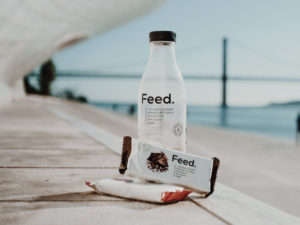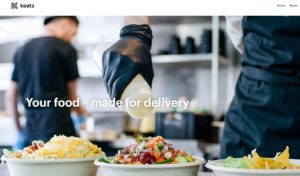The €4.5 trillion global food industry is currently being influenced by numerous developments. From how food is designed, grown to how it’s consumed, the ‘next generation’ of foodtech entrepreneurs are fighting for its piece of the pie. In the meantime, funding for food tech has skyrocketed and according to a report from Dealroom.co, foodtech has created 35 unicorns globally, with a combined value of €169 billion, of which €30 billion from Europe.
Few innovations introduced by European startups are currently shaping the future of food and give us a glimpse of what the future holds for the food industry.
The Magic of Food Science
 One of the most interesting developments in the food industry is the introduction of new origins of food. Have you ever imagined that food could actually be made of electricity, air and water? Well, the Finnish company Solar Foods is here to make you believe it. They have produced a nutrient-rich protein, Solein, with air, water, and electricity as its main resources, laced with bacteria. Solar Foods makes Solein by extracting CO₂ from the air using carbon-capture technology, and then combines it with water, nutrients and vitamins, using 100 percent renewable solar energy. Science fiction? Not so much. More like science fact. The end product looks and tastes like wheat flour, with 50% protein content and 5–10 % fat and 20–25 % carbs. “Producing Solein is entirely free from agriculture – it doesn’t require arable land or irrigation and isn’t limited by climate conditions,” said Solar Foods. And the best part of it? It will never run out.
One of the most interesting developments in the food industry is the introduction of new origins of food. Have you ever imagined that food could actually be made of electricity, air and water? Well, the Finnish company Solar Foods is here to make you believe it. They have produced a nutrient-rich protein, Solein, with air, water, and electricity as its main resources, laced with bacteria. Solar Foods makes Solein by extracting CO₂ from the air using carbon-capture technology, and then combines it with water, nutrients and vitamins, using 100 percent renewable solar energy. Science fiction? Not so much. More like science fact. The end product looks and tastes like wheat flour, with 50% protein content and 5–10 % fat and 20–25 % carbs. “Producing Solein is entirely free from agriculture – it doesn’t require arable land or irrigation and isn’t limited by climate conditions,” said Solar Foods. And the best part of it? It will never run out.
 Changing the way we source ingredients brings us to the next big thing in food science – meat grown in a lab. Lab-grown meat is slowly becoming an alternative food option. A few years ago, Mosa Meat got the world’s attention when it announced the first-ever lab-grown meat burger from cow cells. The spin-off company from Maastricht University introduced the ‘cultured meat’ in Europe and now, one of the newest companies to enter the market is Higher Steaks. Using state-of-the-art cell culture techniques, the UK-startup develops cell-based meat that has the potential to use 99% less land, 96% less water, 45% less energy and has up to 96% less greenhouse gas emissions, all the while tasting as conventional meat. The company uses stem cells obtained via a small blood sample or a skin patch and patented “protocols” licensed exclusively from its American university partners, allowing them to reprogramme stem cells into tissues like muscle and fat. “A single blood sample could allow indefinite production of many meat products,” its website states. Around the world, the demand for clean meat is consistently growing. Optimistically, their pork sausages will reach the market by 2021.
Changing the way we source ingredients brings us to the next big thing in food science – meat grown in a lab. Lab-grown meat is slowly becoming an alternative food option. A few years ago, Mosa Meat got the world’s attention when it announced the first-ever lab-grown meat burger from cow cells. The spin-off company from Maastricht University introduced the ‘cultured meat’ in Europe and now, one of the newest companies to enter the market is Higher Steaks. Using state-of-the-art cell culture techniques, the UK-startup develops cell-based meat that has the potential to use 99% less land, 96% less water, 45% less energy and has up to 96% less greenhouse gas emissions, all the while tasting as conventional meat. The company uses stem cells obtained via a small blood sample or a skin patch and patented “protocols” licensed exclusively from its American university partners, allowing them to reprogramme stem cells into tissues like muscle and fat. “A single blood sample could allow indefinite production of many meat products,” its website states. Around the world, the demand for clean meat is consistently growing. Optimistically, their pork sausages will reach the market by 2021.
Diet for One and the Birth of Personalised Nutrition
 One of the biggest advantages of nutrition in the modern age is personalisation. The basic idea is very simple: we all love food, but which food is good for us? Nutrino can give you the answer. The company unlocks the potential of nutritional data and provides its users with smart, personalised analyses of how their bodies interact with the foods they eat. By using machine learning and artificial intelligence, Nutrino’s platform collects, processes, and analyses food-related data from its users, matches it with their ever-growing nutritional database and defines an individualised nutrition profile, called FoodPrint. By knowing your own FoodPrint, you will never again question what to eat. Closely related to the idea of eating the food that suits you best is the freedom to choose it. But in today’s hectic world, we often forget about its importance.
One of the biggest advantages of nutrition in the modern age is personalisation. The basic idea is very simple: we all love food, but which food is good for us? Nutrino can give you the answer. The company unlocks the potential of nutritional data and provides its users with smart, personalised analyses of how their bodies interact with the foods they eat. By using machine learning and artificial intelligence, Nutrino’s platform collects, processes, and analyses food-related data from its users, matches it with their ever-growing nutritional database and defines an individualised nutrition profile, called FoodPrint. By knowing your own FoodPrint, you will never again question what to eat. Closely related to the idea of eating the food that suits you best is the freedom to choose it. But in today’s hectic world, we often forget about its importance.
 Luckily, we have Gousto. Providing users with 40 recipes on a weekly basis, this cook-at-home meal kit service delivers to your doorstep correctly portioned fresh ingredients matched to each recipe of your choice. Backed by an AI recipe recommendation tool, cooking at home has never been easier. Gousto has set an ambitious target of delivering 400 million balanced and nutritious meals by 2025. As consumers’ growing request towards greater convenience in eating fresh foods and leading healthier lives increases, Gousto will reach its goal in no time. The same applies for Frichti, the most-funded food startup in France. Aiming to become the second kitchen of Parisians, Frichti offers healthy, seasonal meals at affordable prices, coupled with a fast delivery service. Now their recipe for success is expanding across Europe.
Luckily, we have Gousto. Providing users with 40 recipes on a weekly basis, this cook-at-home meal kit service delivers to your doorstep correctly portioned fresh ingredients matched to each recipe of your choice. Backed by an AI recipe recommendation tool, cooking at home has never been easier. Gousto has set an ambitious target of delivering 400 million balanced and nutritious meals by 2025. As consumers’ growing request towards greater convenience in eating fresh foods and leading healthier lives increases, Gousto will reach its goal in no time. The same applies for Frichti, the most-funded food startup in France. Aiming to become the second kitchen of Parisians, Frichti offers healthy, seasonal meals at affordable prices, coupled with a fast delivery service. Now their recipe for success is expanding across Europe.
Innovations in Food Creation: 3D Food Printing
 As the world goes digital, it’s time to digitise our kitchens as well. A Spanish startup called Natural Machines has introduced to the world a 3D food printer by the name of Foodini. Foodini uses fresh ingredients loaded into stainless steel capsules to make foods like pizza, pasta, quiche, pancakes or brownies. Not to be mistaken, a real pizza will not come of Foodini, but the dough for the pizza will be as it was prepared by an Italian grandmother. Foodini simply manages the difficult and/or time-consuming parts of handmade food preparation that often discourage people from cooking at home. The decorative potential of the device is also worth mentioning. From everyday foods to elaborate creations, each piece is visually appealing, inviting Michelin-star restaurants to boost their culinary creativity and elevate the restaurant experience.
As the world goes digital, it’s time to digitise our kitchens as well. A Spanish startup called Natural Machines has introduced to the world a 3D food printer by the name of Foodini. Foodini uses fresh ingredients loaded into stainless steel capsules to make foods like pizza, pasta, quiche, pancakes or brownies. Not to be mistaken, a real pizza will not come of Foodini, but the dough for the pizza will be as it was prepared by an Italian grandmother. Foodini simply manages the difficult and/or time-consuming parts of handmade food preparation that often discourage people from cooking at home. The decorative potential of the device is also worth mentioning. From everyday foods to elaborate creations, each piece is visually appealing, inviting Michelin-star restaurants to boost their culinary creativity and elevate the restaurant experience.
The Rise of the Functional Beverage
 One bottle. One meal. This is the new norm across Europe. Feed has made sure of that. The French startup has introduced a nutritionally complete and convenient meal packed in a bottle, containing just the right amount of protein, essential fats, carbohydrates, vitamins and minerals. All the nutrients one’s body needs. Just add some water, shake it a bit and drink it. “Feed is a new form of nutrition that offers you freedom. Healthy, convenient and economical, Feed will simplify your life,” said Anthony Bourbon, CEO of Feed. Feed is vegan, gluten-free, lactose-free, GMO-free, nut-free and comes in the form of nutrition bars (100g), drinks (500ml), drink mixes and other products. Holding the reputation of delivering quick nutrition, it seems like meal replacements are here to stay. This just might be the end of food, as we know it.
One bottle. One meal. This is the new norm across Europe. Feed has made sure of that. The French startup has introduced a nutritionally complete and convenient meal packed in a bottle, containing just the right amount of protein, essential fats, carbohydrates, vitamins and minerals. All the nutrients one’s body needs. Just add some water, shake it a bit and drink it. “Feed is a new form of nutrition that offers you freedom. Healthy, convenient and economical, Feed will simplify your life,” said Anthony Bourbon, CEO of Feed. Feed is vegan, gluten-free, lactose-free, GMO-free, nut-free and comes in the form of nutrition bars (100g), drinks (500ml), drink mixes and other products. Holding the reputation of delivering quick nutrition, it seems like meal replacements are here to stay. This just might be the end of food, as we know it.
The Future of Dining is Delivery
 Welcome to Keatz, the virtual restaurant without guests. Under the slogan ‘We cook, you enjoy’. Keatz has been operating since 2016 as the latest addition to the restaurant delivery marketplace. As one of the pioneers of the Ghost restaurants concept, Keatz is up and running thanks to the ongoing popularity of food delivery platforms. Currently it operates a total of 10 virtual restaurants in Berlin, Munich, Madrid, Amsterdam and Barcelona, focusing exclusively on food ‘made for delivery’, with minimal capital expenditure and time. Their idea is rather simple. Why should you do groceries and spend time cooking if you can get a great meal delivered in 20 minutes? Living in an on-demand society, consumers are expecting to get what they need whenever they want, and wherever they want. Food is no exception to that.
Welcome to Keatz, the virtual restaurant without guests. Under the slogan ‘We cook, you enjoy’. Keatz has been operating since 2016 as the latest addition to the restaurant delivery marketplace. As one of the pioneers of the Ghost restaurants concept, Keatz is up and running thanks to the ongoing popularity of food delivery platforms. Currently it operates a total of 10 virtual restaurants in Berlin, Munich, Madrid, Amsterdam and Barcelona, focusing exclusively on food ‘made for delivery’, with minimal capital expenditure and time. Their idea is rather simple. Why should you do groceries and spend time cooking if you can get a great meal delivered in 20 minutes? Living in an on-demand society, consumers are expecting to get what they need whenever they want, and wherever they want. Food is no exception to that.
Fixing Food Loss with Technology
 1.3 billion tonnes of food is wasted every year, taking an enormous toll on the planet. At the same time, hunger remains one of the most urgent development challenges of our time. Luckily, consumers are becoming more environmentally conscious and plus, now they have technology to help them distribute the leftovers. This is what Karma is doing. Helping restaurants, cafes and shops to distribute their surplus food to Karma users who get to buy food at half price or more. By making a shared platform on which customers and food providers co-exist and benefit from each other, Karma has found an effective solution for tackling the issue of food waste. A win -win situation. Over 550 tonnes of food have so far been rescued and counting…
1.3 billion tonnes of food is wasted every year, taking an enormous toll on the planet. At the same time, hunger remains one of the most urgent development challenges of our time. Luckily, consumers are becoming more environmentally conscious and plus, now they have technology to help them distribute the leftovers. This is what Karma is doing. Helping restaurants, cafes and shops to distribute their surplus food to Karma users who get to buy food at half price or more. By making a shared platform on which customers and food providers co-exist and benefit from each other, Karma has found an effective solution for tackling the issue of food waste. A win -win situation. Over 550 tonnes of food have so far been rescued and counting…
Looking for startups innovating in a particular sector? If you’re a corporate or investor looking for exciting startups in a specific market for a potential investment or acquisition, check out our Startup Sourcing Service!




